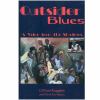Search Results: Returned 10 Results, Displaying Titles 1 - 10
-
-
2007., Between the Lines ; South End Press Call No: BLK 305.896 B627b Availability:1 of 1 At Your Library Summary Note: The global history of black people cannot be told without addressing powerful geographical shifts: massive forced migration, land dispossession, and legal as well as informal structures of segregation. From the Middle Passage to the "Whites Only" signposts of North American apartheid, the black disaporic experience is rooted firmly in the politics of place. Literature ahs long explored cultural differences in the experience of blackness in different quarters of the diaspora. But what are the real differences between being a maroon in the hills of Jamaica, a fugitive slave in Chatham, Ontario, and a runaway in the swamps of Florida? How does location impact repression and resistance, both on the ground and in the terrain of political imagination? Enter Black Geographies. In this path-breaking collection, twelve authors interrogate the intersections between space and race. For instance, some scholars, activists, and communities have sought to protect, restore, and reimagine black historical sites. Yet each of these locations has in common acts of racial hatred and state terrorism that have erased black geographies, leaving few historical structures standing. This begs the question: Can preserving and restoring such sites promote social justice and spur community redevelopment?Black geographies-invisible and visible, past and present-pose revealing questions about the politics, and possibilities, of place. (From book cover.)
-
-
c2010., McGill-Queen's University Press Call No: QWF BLK 971.428 M157d c.2 Availability:1 of 1 At Your Library Series Title: Studies on the history of Quebec Volume: 21.
-
-
-- Black nation :2013., Adult, Between the Lines Edition: eBook ed. Summary Note: "In the 1960s, for at least a brief moment, Montreal became what seemed an unlikely center of Black Power and the Caribbean left. In October 1968 the Congress of Black Writers at McGill University brought together well-known Black thinkers and activists from Canada, the United States, Africa, and the Caribbean -- people like C.L.R. James, Stokely Carmichael, Miriam Makeba, Rocky Jones, and Walter Rodney. Within months of the Congress, a Black-led protest at Sir George Williams University (now Concordia) exploded on the front pages of newspapers across the country -- raising state security fears about Montreal as the new hotbed of international Black radical politics"--Provided by publisher.
-
-
2017., Adult, ECW Press. Call No: BLK Bio J75i Edition: hardback. Availability:1 of 1 At Your Library Summary Note: B. Denham Jolly, who successfully launched the first entirely Black-owned Canadian radio station, presents his autobiography.
-
-
c2010., University of North Carolina Press Call No: BLK 305.8 M431n Availability:1 of 1 At Your Library Series Title: John Hope Franklin series in African American history and culture.Summary Note: North of the Color Line examines life in Canada for the estimated 5,000 blacks, both African Americans and West Indians, who immigrated to Canada after the end of Reconstruction in the United States. Through the experiences of black railway workers and their union, the Order of Sleeping Car Porters, Sarah-Jane Mathieu connects social, political, labor, immigration, and black diaspora history during the Jim Crow era. --from publisher description.
-
-
2017., General, Fernwood Publishing Call No: QWF BLK 305.8 M471p Availability:1 of 1 At Your Library Summary Note: "An exposure of historical and contemporary practices of state-sanctioned violence against Black lives in Canada. This groundbreaking work dispels many prevailing myths that cast Canada as a land of benevolence and racial equality, and uncovers long-standing state practices that have restricted Black freedom. How anti-Blackness has influenced the construction of Canada's carceral landscape, including the development and application of numerous criminal law enforcement and border regulation practices. The historical and contemporary mobilization of anti-Blackness spanning from slavery, 19th and 20th century segregation practices, and the application of early drug and prostitution laws through to the modern era. The ongoing legacy of a demonized and devalued Blackness that is manifest today as racial profiling by police, immigration agents and social services, the over-representation of Black communities in jails and prisons, anti-Black immigration detention and deportation practices, the over-representation of Black youth in state care, the school-to-prison pipeline and gross economic inequality. Following the dictums of the Black Lives Matter movement, Policing Black Bodies adopts an intersectional lens that explores the realities of those whose lives and experiences have historically been marginalized, stigmatized, and made invisible. In addressing how state practices have impacted Black lives, the book brings from margin to centre an analysis of gender, class, sexuality, (dis)ability, citizenship and criminalization. Beyond exploring systemic racial injustice, Policing Black Bodies pushes the limits of the Black radical imagination: it delves into liberatory Black futures and urges the necessity of transformative alternatives. Robyn Maynard is a Black feminist writer, grassroots community organizer and intellectual based in Montreal."--Provided by publisher.
-
-
-- Narratives of fugitive slaves in Canada.2000., Prospero Books Call No: BLK 973.71 D776r Availability:1 of 1 At Your Library Series Title: Prospero Canadian collection
-
-
2024., Adult, Esplanade Books Call No: BLK Fic Nda Availability:1 of 1 At Your Library Summary Note: The paths of a Canadian documentary filmmaker and two former rebel soldiers from the Congo collide in this searing revenge tale about those who profit from the misery of others.








![Fear of a Black nation [eBook] : race, sex and security in sixties Montreal Fear of a Black nation [eBook] : race, sex and security in sixties Montreal](/Library/images/~imageCT76341.JPG)





